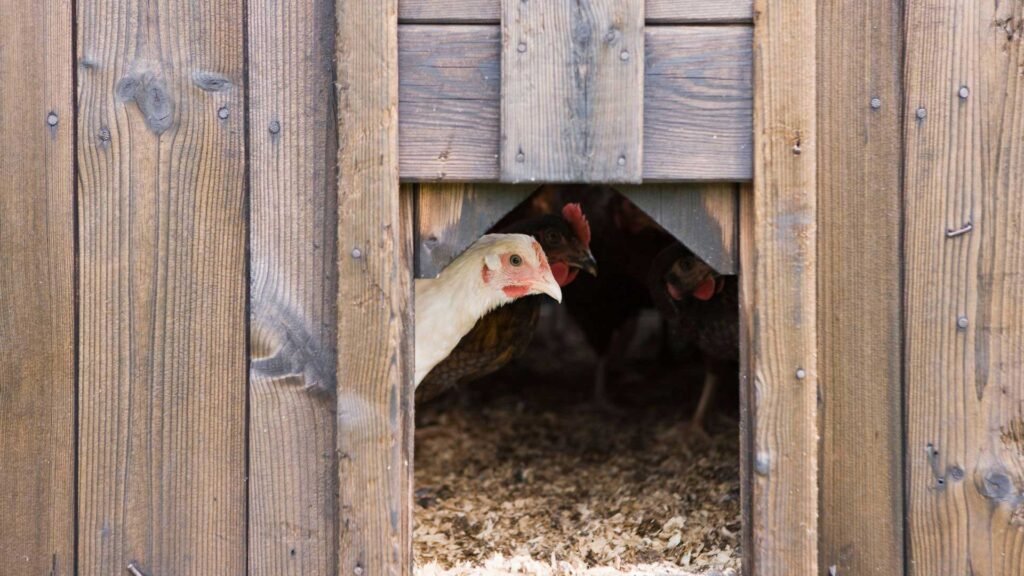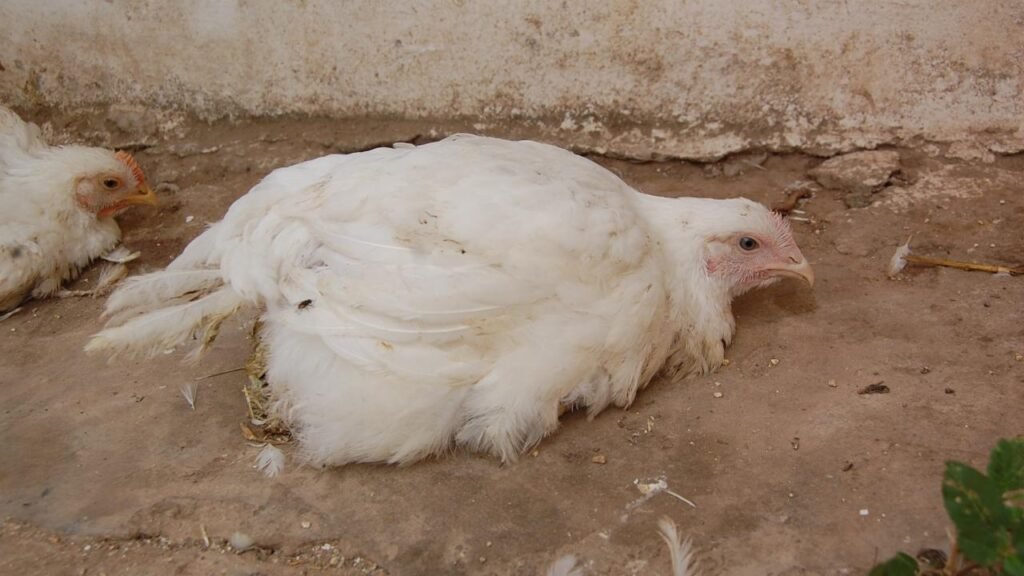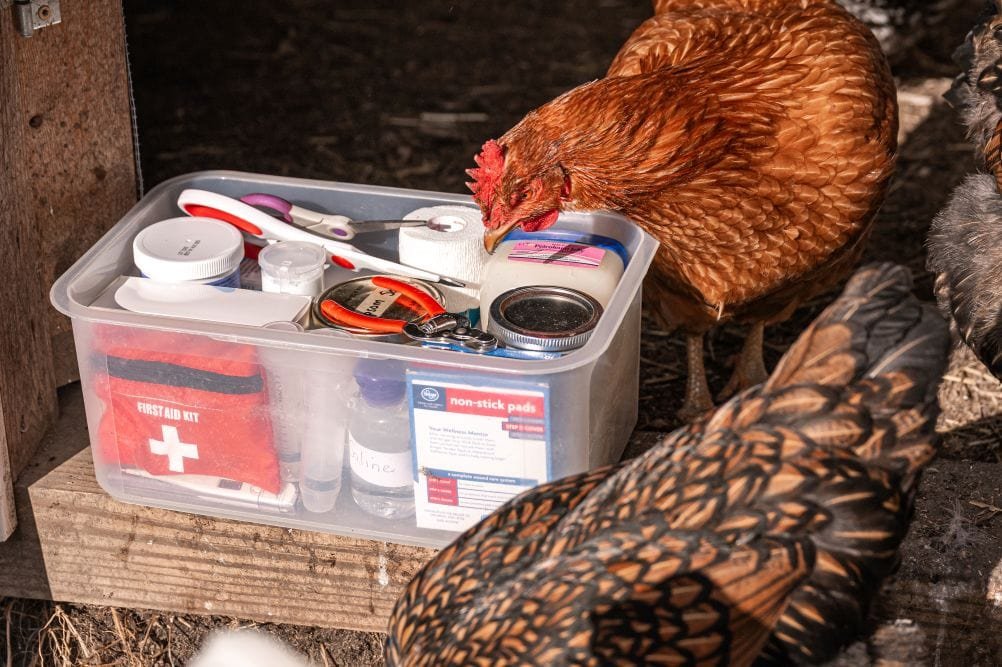Every chicken keeper knows the constant battle against the “creepy crawlies” that threaten a flock. From tiny mites and lice that pester your birds to internal worms that can compromise their health, parasites are a fact of life. While many commercial products exist, you may be looking for a more holistic, integrated pest management approach that prioritizes natural ways to keep parasites out of your coop.
This guide is designed to provide you with a holistic plan that focuses on prevention and support. We will explore proven, natural strategies as well as some widely used anecdotal remedies, so you can make informed decisions for your flock.
Crucial Disclaimer: This guide focuses on natural prevention and support strategies. A heavy or persistent parasite infestation can be life-threatening and requires consultation with a veterinarian or the use of proven commercial treatments. Always prioritize your flock’s health.
Key Principles of Natural Parasite Control
- Prevention is Paramount: A clean, dry coop is your most powerful tool.
- Empower Your Flock: Provide an excellent dust bath area to let chickens treat themselves.
- Support from Within: Use supplements like ACV and garlic to boost gut health and immunity.
- Be Vigilant: Quarantine new birds and perform regular health checks on your flock.
The Foundation of a Parasite-Free Flock: Prevention First
No amount of herbs or supplements can fix a dirty environment. The most powerful natural method of parasite control is maintaining a clean, dry living space for your chickens.
Impeccable Coop Hygiene
Regular cleaning is your first and most effective defense. This means daily spot-cleaning of droppings and performing a full deep clean of the coop every few months. Parasite eggs, especially oocysts that cause coccidiosis, thrive in moist, dirty conditions. A thick, dry layer of bedding, such as pine shavings, is essential for absorbing moisture and keeping the floor clean. A damp environment, often caused by rain and poor drainage, is a parasite’s best friend.
For many keepers, a more long-term strategy is the deep litter method. This involves adding fresh layers of carbon-rich bedding on top of old bedding, allowing the material to compost in place. The beneficial bacteria created by this composting process can help break down harmful pathogens. This method is excellent for insulation and improving gut health but requires diligent turning and management to prevent a build-up of moisture and parasites.
The Power of Sunlight
Sunlight is a natural and powerful disinfectant. UV rays have the ability to kill bacteria and parasite eggs. Whenever possible, open the coop up to full sunlight after a deep clean. This simple step is an invaluable part of your biosecurity plan, helping to sanitize surfaces without the use of harsh chemicals. Parasite eggs like coccidia cannot survive prolonged exposure to direct sunlight. When you remove bedding, allowing the floor to bask in the sun for several hours is a fantastic way to kill any remaining pathogens.
Smart Biosecurity
Biosecurity is the practice of preventing disease from entering your flock. The most common way parasites and diseases are introduced is through new birds. Stress the importance of quarantining them for 30 days before introducing them to the flock. This gives you time to observe them for any signs of illness or parasites and treat them accordingly. During this quarantine period, keep their food, water, and tools separate to prevent any cross-contamination. Extending this practice to wild birds and pests is also vital; keep wild bird feeders away from the coop and ensure all food is in sealed containers to avoid attracting unwanted guests.
With a clean coop and smart biosecurity in place, you’ve built a strong foundation. Now, let’s explore how to fortify the coop itself with natural repellents and preventative tools.
Fortifying the Coop: What to Put in Your Coop to Keep Bugs Away
This section focuses on external parasites like mites and lice. The goal is to make the coop an inhospitable environment for them to live and breed.
The Ultimate Dust Bath: Your Flock’s First Line of Defense
A chicken’s natural instinct to take a dust bath is their single most effective defense against external parasites. It helps them smother and remove mites and lice from their feathers. The act of dust bathing irritates the parasites, causing them to detach from the bird’s skin. You can enhance this natural behavior by providing a specific “dust bath recipe” for them.
Dust Bath Recipe:
- A base of fine sand or loose soil.
- A ratio of 1 part food-grade Diatomaceous Earth (DE) to 10 parts sand/soil.
- A sprinkle of wood ash from a safe source (like a fireplace).
Safety Note: When using Diatomaceous Earth, always choose food-grade DE and wear a mask during application to avoid inhaling the dust, as it can be an irritant. DE kills parasites mechanically by scratching their exoskeletons, causing them to dehydrate and die. For best results, place the dust bath in a covered area to keep it dry and effective.
What Herbs Get Rid of Chicken Mites? Using Aromatic Nesting Boxes
Certain strong-smelling herbs are believed to act as natural insect repellents. While they won’t kill parasites, they may help deter them from taking up residence in nesting boxes and on roosts. Add dried Lavender, Mint, Marigold, Lemon Balm, and Oregano to your nesting boxes. The strong aromas can confuse or repel pests, making the coop less appealing for colonization.
How to Disinfect a Chicken Coop Naturally
For a full, natural deep clean of your coop, follow this step-by-step guide:
- Remove Everything: Take out all bedding, feeders, waterers, and nesting box materials.
- Scrub Surfaces: Use a 1:2 solution of apple cider vinegar and water to scrub all surfaces, paying special attention to roosts and crevices.
- Dry Completely: Allow the coop to air dry in full sunlight for maximum disinfection.
- Apply a Light Dusting: Before adding fresh bedding, apply food-grade DE to the floor and into any cracks.
With your coop fortified and your birds’ defenses strengthened from the outside, let’s explore how to boost their health from within to create an environment where internal parasites struggle to survive.
Boosting from Within: How to Deworm Chickens Naturally
This section focuses on internal parasites like roundworms and coccidia. These methods are primarily for prevention and general gut health.
The Great Debate: Does Apple Cider Vinegar, Garlic, and Cayenne Work?
- Apple Cider Vinegar (ACV): ACV is not a dewormer. Its primary benefit is in promoting good gut health by making the digestive tract slightly more acidic, creating a less hospitable environment for parasites. The added probiotics in raw, unpasteurized ACV with “The Mother” can also help the chicken’s digestive system to function optimally. A good rule of thumb is no more than one tablespoon per gallon of water.
- Garlic: Garlic has natural antimicrobial and immune-boosting properties. It may help strengthen a chicken’s natural defenses. You can add crushed fresh cloves to their water periodically or mix finely chopped garlic into their feed.
- Cayenne/Red Pepper Flakes: There is a theory that cayenne pepper may help expel worms and deter external pests. While not scientifically proven, many keepers use it as a preventative measure. The capsaicin in the pepper may irritate a parasite’s digestive tract, making it less likely to survive.
Powerful Foods for Parasite Prevention
Pumpkin Seeds are the most commonly cited natural remedy for internal parasites. Raw, crushed pumpkin seeds contain cucurbitacin, an amino acid that paralyzes worms, allowing the chicken to pass them. This is best used for prevention and mild cases of worms, not a full-blown infestation. A heavy infestation can lead to a host of problems, including severe diarrhea. Another good option is to offer grated carrots, as the texture can help scrape parasites from the intestinal walls. You can also mix thyme or oregano into their feed, as these herbs are known for their natural anti-parasitic properties.
A Special Note for Keepers in Nigeria and Around the World
For keepers in Nigeria and other parts of the world, the most powerful and accessible natural methods are universal: strict cleanliness, dry conditions, and using common, globally available kitchen ingredients. Garlic, pumpkin seeds, and cayenne pepper are excellent starting points. Good hygiene is the most effective “natural” method of all and costs nothing but time and effort. These methods can be especially valuable where commercial products are not readily available.
Even with the best preventative measures, parasites can sometimes take hold. Knowing how to act quickly and decisively in an emergency is critical for your flock’s health.
Emergency Action: What to Do If Your Chickens Already Have Parasites
When you spot a problem, acting quickly is crucial. The earlier you intervene, the better the outcome.
How to Inspect Your Flock for Parasites
Regular physical inspections are key. At night, after your chickens have settled on their roosts, use a flashlight to check for red roost mites. These tiny pests hide in crevices during the day and come out at night. To check for lice, part the feathers around the vent and look for small clusters of eggs at the base of the feather shafts. A chicken that is itching, has a pale comb, or is losing weight may have internal parasites.
What is the Fastest Way to Get Rid of Mites on Chickens?
For an active infestation, you need a clear, two-pronged attack:
- Treat the bird: Thoroughly dust the chicken’s feathers, especially under the wings and around the vent, with food-grade DE or a commercial poultry dust. Repeat this treatment in 7-10 days to kill any parasites that have since hatched from eggs.
- Treat the coop: Perform a full deep clean as described above, paying special attention to cracks and roosts where red roost mites hide. These mites come out at night to feed on your chickens’ blood, so finding and treating their daytime hiding spots is key to breaking their life cycle.
Help! I Have Chicken Mites in My House or on Me!
This is a common fear. Reassure the reader that chicken mites cannot survive or reproduce on humans. They may bite, but they will not infest your home. Advise them to shower and wash their clothes in hot water and focus on eradicating the source: the coop.
What to Do for Internal Parasites (Worms)
If a chicken is visibly sick from worms (pale, lethargic, worms in droppings), natural methods are too slow. This is when a vet-recommended dewormer is necessary for the bird’s welfare. Natural methods are for prevention, not for curing a severe infestation. Having these treatments and other essential supplies ready is a key part of a well-stocked chicken first aid kit.
With a solid plan for both prevention and emergency action, you’re well on your way to a healthy flock. Now, let’s tackle some of the most common questions that arise on the topic.
Frequently Asked Questions (FAQ)
Q: Can you eat eggs from chickens with worms?
A: Generally, yes. The worms are in the chicken’s digestive tract, not the egg. However, it’s a strong sign that you need to treat your flock. If using a chemical dewormer, you must follow the specified egg withdrawal period to ensure the eggs are safe to consume.
Q: Is cinnamon safe for chickens?
A: Yes, in small amounts. Cinnamon has anti-inflammatory and antioxidant properties and is safe to sprinkle on their feed occasionally.
Q: What happens if you give chickens too much apple cider vinegar?
A: Too much can be overly acidic, potentially causing digestive upset or irritating their crop. A good rule of thumb is no more than one tablespoon per gallon of water.
Q: Does cayenne pepper deworm chickens?
A: While many keepers use cayenne pepper as a preventative, there is little scientific evidence that it acts as a dewormer. It’s more of an anecdotal remedy.
Q: What herbs get rid of chicken mites?
A: Aromatic herbs like lavender and mint may help deter mites due to their strong smell, but they do not kill or get rid of an existing infestation.
Q: Is wormwood safe for chickens?
A: Wormwood (Artemisia) can be toxic if used improperly or in high doses. It’s best to avoid it unless you are under the specific guidance of a professional.
In conclusion, a natural approach to parasite control is a proactive, holistic system. It is built on three key pillars: a clean and dry environment, a strong and healthy flock, and the strategic use of natural supplements. By focusing on these principles, you can create a healthy, resilient flock that is well-equipped to manage parasites naturally.


